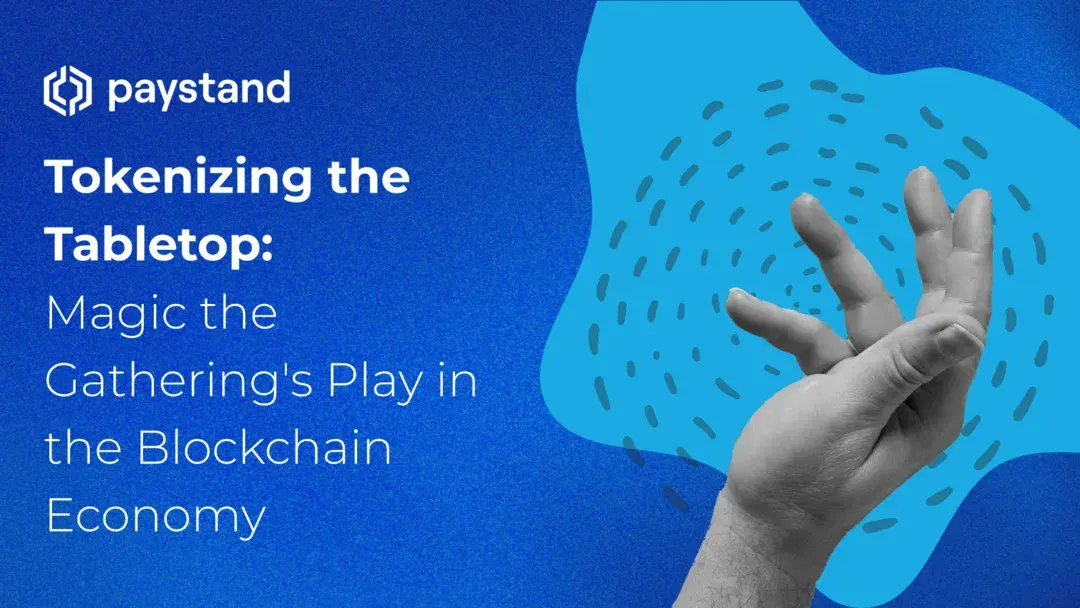Tokenizing the Tabletop: Magic the Gathering's Play in the Blockchain Economy

Magic: The Gathering, a renowned trading card game, has left an indelible mark on the gaming industry. However, its impact extends beyond entertainment, laying the foundation for integrating blockchain technology into finance.
Have you ever wondered how a card game like Magic: the Gathering could shape the future of finance? Well, there's more to Magic than just trading cards and dueling wizards.
Imagine this as your backstage pass to the financial world where things are changing, and Magic the Gathering is our guide. So, if you're into finance and curious about blockchain (or just a Magic fan), this is your ticket to understanding why these seemingly different worlds might be best friends. Ready to crack the code? Let's dive into the unique crossover between Magic: the Gathering and the future of finance with blockchain.
Immutable's Origin and the Gaming Revolution
The journey begins with the birth of Immutable, a company that sought to revolutionize the gaming industry using blockchain. The founders drew inspiration from the success of Magic: The Gathering and its physical cards market. Recognizing the potential of applying similar principles in the digital space, Immutable embarked on a mission to create a decentralized platform for gaming assets.
Immutable's first foray into this space was creating a multiplayer blockchain game named "Etherbots." Despite its initial success, the team quickly realized the challenges associated with the user experience and the high costs incurred due to on-chain transactions (direct operational executions on the blockchain; each transaction is recorded and verified on the distributed ledger). This realization paved the way for developing a platform that provides absolute economic rights around game items.
The Birth of God’s Unchained and Immutable's Ascension
To solidify its position in the blockchain gaming landscape, Immutable ventured into creating a trading card game called "God’s Unchained.” This game achieved considerable success, laying the groundwork for the platform. Today, Immutable is the largest platform for decentralized games, boasting partnerships with industry giants such as Disney, DC Comics, and TikTok.

Blockchain: Transforming Digital Ownership
Blockchain technology, as championed by Immutable, offers a solution to the longstanding issue of digital ownership. In traditional gaming models, players invest significant sums in outfits, skins, and in-game items, only to find themselves at the mercy of centralized servers with zero real-world value for their digital assets. Immutable's vision is to provide users with guaranteed property rights, allowing them to actually own and trade their in-game possessions.
Before delving deeper into the financial applications of blockchain in gaming, it is essential to understand the sheer magnitude of the gaming industry. With an annual revenue exceeding $300 billion globally, gaming surpasses the combined earnings of the movie, entertainment, and media industries. The actual economic driver within this sector doesn't lie in-game purchases but in virtual items and in-game assets.
The Power of NFTs and Token Economics
Introducing Non-Fungible Tokens (NFTs) brought a revolutionary change in gaming. The first NFT, the CryptoPunk, began a new era where digital assets could be uniquely owned, traded, and stored on the blockchain. Immutable's use of token economics further strengthened this paradigm shift.
In the gaming world, token economics incentivizes players and developers alike. Players get rewards for their actions, fostering a sense of ownership and engagement.
On the other hand, developers benefit from a new business model that aligns with the long-term economic value of their games. This model has found success in gaming and serves as a blueprint for broader financial applications.
Magic: The Gathering's Influence on Tokenization
Magic: The Gathering's (MTG) impact extends beyond gaming, particularly in tokenization. Immutable's approach to token economics draws inspiration from the game's secondary market, where physical cards hold substantial value.
By tokenizing assets, whether gaming or real-world items, blockchain enables programmable equity creation – a concept closely related to MTG.
Tokenization in the broader financial landscape holds immense potential. Gaming is the gateway, demonstrating how digital assets, once tokenized, can be easily traded, shared, and leveraged across various applications.
The Future Beyond Gaming
As blockchain technology evolves, its principle applications extend far beyond gaming. Immutable's vision aligns with the belief that blockchain will transform how value is stored and created across various domains.
Real-world assets, from time deposits to homes, insurance contracts, and intellectual property, could be tokenized, ensuring guaranteed property rights and access to efficient financial infrastructure.
While blockchain's potential in the financial sector is huge, there still are challenges. Decentralization, one of blockchain's core principles, often clashes with regulatory frameworks. Platforms like Coinbase have recently faced scrutiny of the ongoing debate around how these systems interface with existing regulations.
Immutable's strategy involves maintaining compliance as a priority of blockchain companies, providing a safer experimentation space in gaming. They hope to build a bridge between the traditional financial world and the innovative realm of blockchain.
Discovering the Parallels Between MTG and Blockchain
Magic: The Gathering's influence on blockchain is evident. From gaming to real-world assets, the parallels between its economic model and blockchain's financial applications are striking.
Think of Magic cards as the OG tokens. Each card is unique, with its own set of powers and rarity. Now, transfer that idea to blockchain tokens. They're like the grown-up version of Magic cards, representing digital assets on the blockchain. Whether it's a rare Magic card or a unique blockchain token, both hold real value, and people want to trade them like treasures.
Magic: the Gathering isn't just a card game; it's a blueprint for future blockchain financial applications. Remember the thrill of trading cards with your friends? Now, imagine that with blockchain tokens representing real-world assets.
If you're itching to know more about how Magic: the Gathering and blockchain are rewriting the rules of finance, we've got the perfect treat for you. Listen to the reDeFined podcast hosted by Jeremy Almond, CEO and founder of Paystand. He dives deep into the connections between MTG and blockchain, unlocking secrets that could redefine how we view money and games.
Get ready to embrace the magic – hit play on the podcast, and let the financial adventure begin!





